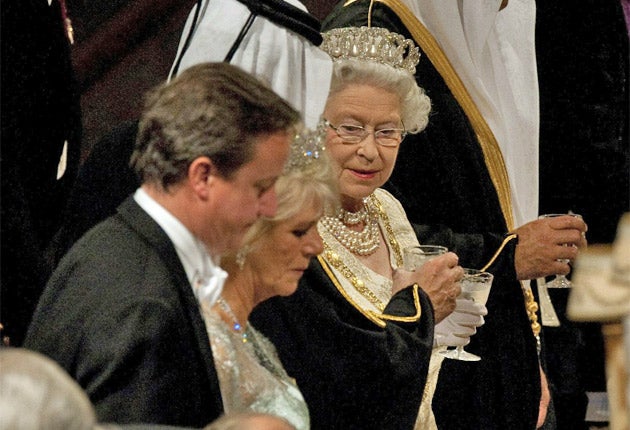Cameron made to pay more for EU membership

Your support helps us to tell the story
From reproductive rights to climate change to Big Tech, The Independent is on the ground when the story is developing. Whether it's investigating the financials of Elon Musk's pro-Trump PAC or producing our latest documentary, 'The A Word', which shines a light on the American women fighting for reproductive rights, we know how important it is to parse out the facts from the messaging.
At such a critical moment in US history, we need reporters on the ground. Your donation allows us to keep sending journalists to speak to both sides of the story.
The Independent is trusted by Americans across the entire political spectrum. And unlike many other quality news outlets, we choose not to lock Americans out of our reporting and analysis with paywalls. We believe quality journalism should be available to everyone, paid for by those who can afford it.
Your support makes all the difference.David Cameron will be forced to accept a sizeable increase in Britain's contribution to European Union spending just days after calling for it to be frozen or even cut.
The Prime Minister heads to Brussels today for testing talks with other European heads of state over the EU budget amid calls from the European Parliament and the European Commission for a rise next year of 6 per cent
Mr Cameron denounced the proposed increases last week as "completely irresponsible and unacceptable" and demanded a "freeze or cut" in European spending next year.
Officials now accept that Britain will have to settle for a minimum rise of 2.9 per cent in the EU budget as suggested by the European finance ministers. The EU argues it needs the money to hire more than 300 extra staff and open new offices in New York, Beijing and Moscow.
The proposals have provoked anger on the Conservative backbenches and calls for the Government to veto any increase – an option that Britain now appears to have rejected.
Talks in Brussels will centre on finding a compromise between the 2.9 per cent and 6 per cent figures proposed by the Parliament and European ministers. Mr Cameron will try and limit the increase to as close as possible to the lower figure, which would still cost the Treasury an extra £400m next year.
He is being backed by at least six other EU members, including Austria, Sweden and the Netherlands, in fiercely opposing a 6 per cent rise at a time of austerity across the budget.
The only hope of driving the figure below 2.9 per cent would be if other European leaders were to be won over to a budget freeze. Even if Mr Cameron succeeds in limiting the rise, he is still open to accusations of falsely raising expectations of success by his combative pronouncements on EU spending.
George Osborne, the Chancellor, has also called for a freeze in the EU budget which this year will amount to about £108bn, of which more than £8bn will come from Britain.
The row over the 2011 budget is a curtain-raiser for tough negotiations, due to start next year, on the EU's long-term spending plans for 2014-2020.
Mr Cameron told MPs yesterday: "The greatest priority for Britain should be to fight very hard to get the EU budget under control. It is completely unacceptable at a time when we are making tough budget decisions here that we are seeing spending rise consistently in the European Union."
He will also be dragged into controversy – albeit from the sidelines of the argument – over moves by Germany and France to amend the Lisbon Treaty to enable countries in the single currency to respond to debt crises similar to that which brought Greece close to financial meltdown last year.
The Prime Minister said yesterday that the treaty change would not affect Britain. He told MPs: "From our point of view we are not in the euro; we are not planning to join the euro, and so any treaty change wouldn't apply to us."
But the Tory eurosceptic Peter Lilley urged him not to support any treaty change "without us in return obtaining concessions – for example, the return of powers to this country which were unnecessarily given".
How the EU is funded
Nearly three-quarters of the EU's income is taken straight from its 27 member states. The amount they hand over is calculated according to their national wealth. Britain's contribution this year will be more than £8bn, but is due to rise by 2014 to more than £10bn.
The reason for the increase is the scaling-down of the budget rebate negotiated by the former prime minister Baroness Thatcher. Britain had agreed to a reduction in its rebate in return for an overhaul of the Common Agricultural Policy. There are not yet any concrete plans for its reform.
Join our commenting forum
Join thought-provoking conversations, follow other Independent readers and see their replies
Comments